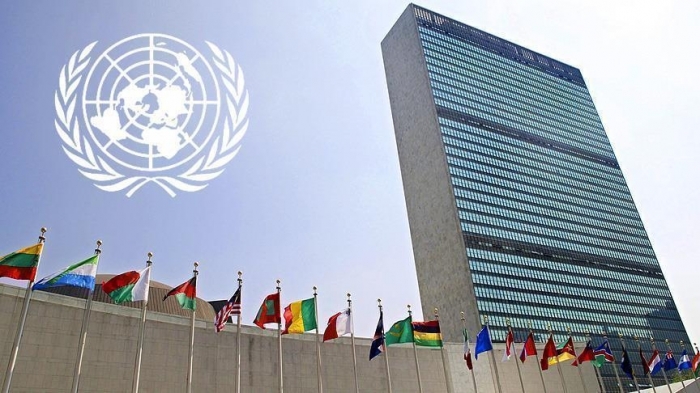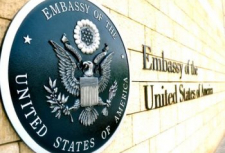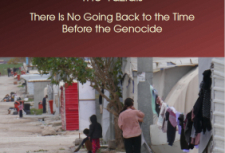UN experts: ISIS committed genocide against Yazidis

The head of a United Nations team investigating atrocities in Iraq announced on Monday that he had found “clear and convincing evidence” that ISIS extremists committed genocide against the Yazidi minority in 2014, and said the militant group had successfully developed chemical weapons and used mustard gas.
Karim Khan told the Security Council that the panel also concluded that war crimes were committed by ISIL against the predominantly Shiite unarmed cadets and staff of the Tikrit Air Academy who were captured, tortured and mass executed in June 2014. He said an ISIS video released in July 2015 showing the killings “constitutes direct and public incitement to commit genocide against Shia Muslims."
In September 2017, the Security Council voted unanimously to ask the United Nations to establish an investigative team to help Iraq preserve evidence and bring to justice what “may amount to war crimes, crimes against humanity and genocide " committed by ISIL extremists in both Iraq and the Levant, including Syria.
In his sixth report to the Council, Khan said the UN Investigation Team to Help Bring to justice Crimes Committed by ISIL, also known as DAESH, ISIL and the Islamic State, has rapidly expanded the amount of evidence it has in its possession over the past six months.
According to him, “significant achievements” in collecting forensic evidence from mass grave sites, digital data extracted from hard drives belonging to ISIL, digitizing case files and using advanced technological tools to process and search databases allowed the team to establish a clear time frame for the activities of key ISIL members.
Khan called it a " landmark moment” that the team, known as UNITAD, established strong evidence that ISIS extremists committed genocide against the Yazidis as a religious group with the intent to destroy the Yazidis physically and biologically. This was reflected in the ISIL ultimatum to all Yazidis to “convert to Islam or die”, which resulted in thousands of deaths or mass executions. Thousands more were enslaved, and women and children were abducted from their families and subjected to the most brutal abuse, including serial rape and other forms of unbearable violence that often resulted in death over the years.
Khan added that crimes against Yazidis continue, with thousands of women and children separated from their families or missing, and some still with their ISIS captors or those to whom they were sold.
In 2016, the UN-mandated Independent International Commission of Inquiry on Syria said that ISIS was committing genocide against the Yazidis, and several non-governmental organizations supported this conclusion. The UNITAD team was tasked with examining various pieces of evidence that could be presented in court. Information from electronic devices that belonged to ISIL extremists also prompted UNITAD to launch a new investigation into the development and successful deployment of ISIL chemical and biological weapons in Iraq.
The evidence gathered by UNITAD details how the militant group used laboratories at Mosul University as the epicenter of its chemical weapons program, drawing on the expertise of scientists and medical professionals from Iraq and abroad. Initially, ISIL used chlorine from treatment plants seized by its militants in 2014, and then developed toxic lethal compounds, including thallium and nicotine, which were tested on live prisoners, which naturally led to death. ISIS then developed a system for producing mustard gas, also called sulfur mustard, which was deployed in March 2016 by launching 40 rockets at the Turkmen Shiite town of Taza Khurmat.
According to Karim Khan, who will become the chief prosecutor of the International Criminal Court on June 15, this investigation is progressing rapidly, and initial results are expected within five months. According to him, by the end of the year, the group also expects initial results in the fight against crimes against minority Christians, Kakai, Shabak, Shiite Turkmen and Sunni communities in Iraq, as well as the mass killings of mainly Shiite prisoners in Badush prison.
He expressed hope that Iraqi lawmakers will adopt a legal framework to prosecute ISIL members for war crimes, crimes against humanity and genocide. Mr Karim welcomed a bill submitted to the Kurdistan Parliament last week to establish a court with jurisdiction over international crimes committed by ISIL.
"We must be sure that we will not become just an archive, just a library. Every member of the international community should feel this urgent need for justice, as if their own mother, father or child had died," Karim Khan said.
Translated by David Babaev
Tags: #yazidisinfo #newsyazidi #UN #humanrights
UN experts: ISIS committed genocide against Yazidis

The head of a United Nations team investigating atrocities in Iraq announced on Monday that he had found “clear and convincing evidence” that ISIS extremists committed genocide against the Yazidi minority in 2014, and said the militant group had successfully developed chemical weapons and used mustard gas.
Karim Khan told the Security Council that the panel also concluded that war crimes were committed by ISIL against the predominantly Shiite unarmed cadets and staff of the Tikrit Air Academy who were captured, tortured and mass executed in June 2014. He said an ISIS video released in July 2015 showing the killings “constitutes direct and public incitement to commit genocide against Shia Muslims."
In September 2017, the Security Council voted unanimously to ask the United Nations to establish an investigative team to help Iraq preserve evidence and bring to justice what “may amount to war crimes, crimes against humanity and genocide " committed by ISIL extremists in both Iraq and the Levant, including Syria.
In his sixth report to the Council, Khan said the UN Investigation Team to Help Bring to justice Crimes Committed by ISIL, also known as DAESH, ISIL and the Islamic State, has rapidly expanded the amount of evidence it has in its possession over the past six months.
According to him, “significant achievements” in collecting forensic evidence from mass grave sites, digital data extracted from hard drives belonging to ISIL, digitizing case files and using advanced technological tools to process and search databases allowed the team to establish a clear time frame for the activities of key ISIL members.
Khan called it a " landmark moment” that the team, known as UNITAD, established strong evidence that ISIS extremists committed genocide against the Yazidis as a religious group with the intent to destroy the Yazidis physically and biologically. This was reflected in the ISIL ultimatum to all Yazidis to “convert to Islam or die”, which resulted in thousands of deaths or mass executions. Thousands more were enslaved, and women and children were abducted from their families and subjected to the most brutal abuse, including serial rape and other forms of unbearable violence that often resulted in death over the years.
Khan added that crimes against Yazidis continue, with thousands of women and children separated from their families or missing, and some still with their ISIS captors or those to whom they were sold.
In 2016, the UN-mandated Independent International Commission of Inquiry on Syria said that ISIS was committing genocide against the Yazidis, and several non-governmental organizations supported this conclusion. The UNITAD team was tasked with examining various pieces of evidence that could be presented in court. Information from electronic devices that belonged to ISIL extremists also prompted UNITAD to launch a new investigation into the development and successful deployment of ISIL chemical and biological weapons in Iraq.
The evidence gathered by UNITAD details how the militant group used laboratories at Mosul University as the epicenter of its chemical weapons program, drawing on the expertise of scientists and medical professionals from Iraq and abroad. Initially, ISIL used chlorine from treatment plants seized by its militants in 2014, and then developed toxic lethal compounds, including thallium and nicotine, which were tested on live prisoners, which naturally led to death. ISIS then developed a system for producing mustard gas, also called sulfur mustard, which was deployed in March 2016 by launching 40 rockets at the Turkmen Shiite town of Taza Khurmat.
According to Karim Khan, who will become the chief prosecutor of the International Criminal Court on June 15, this investigation is progressing rapidly, and initial results are expected within five months. According to him, by the end of the year, the group also expects initial results in the fight against crimes against minority Christians, Kakai, Shabak, Shiite Turkmen and Sunni communities in Iraq, as well as the mass killings of mainly Shiite prisoners in Badush prison.
He expressed hope that Iraqi lawmakers will adopt a legal framework to prosecute ISIL members for war crimes, crimes against humanity and genocide. Mr Karim welcomed a bill submitted to the Kurdistan Parliament last week to establish a court with jurisdiction over international crimes committed by ISIL.
"We must be sure that we will not become just an archive, just a library. Every member of the international community should feel this urgent need for justice, as if their own mother, father or child had died," Karim Khan said.
Translated by David Babaev
Tags: #yazidisinfo #newsyazidi #UN #humanrights

























